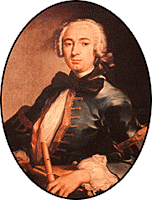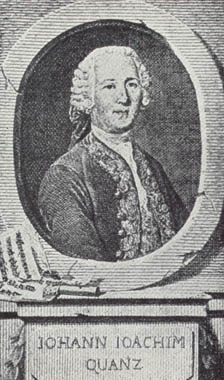

Flutist and composer. He was apprenticed
to his uncle Justus Quantz and served J. A. Fleischhack as a
journeyman until 1716, studying many string and wind
instruments and taking harpsichord lessons from Kiesewetter. He
joined the Dresden town band in 1716, studied counterpoint in
Vienna under
Jan Dismas Zelenka
the following year, and in 1718 was appointed oboist in the
Polish chapel of Augustus II; he also continued to play in
Dresden.  Finding little opportunity for advancement as an
oboist, he took up the flute, studying for four months with P.
G. Buffardin. Quantz traveled to Italy in 1724 and studied
counterpoint with
Gasparini
; he also journeyed to Paris (1726-27), where he added a second
key to his flutes, and to England in 1727, where he met Handel.
Upon his return to Dresden he was made a member of the court
Kapelle. From 1728 he instructed
Prince
Frederick
on the flute, and moved to Berlin in 1741 after Frederick
became King of Prussia.In Berlin, Quantz was exempt from
playing in the opera orchestra; instead, his duties revolved
around the king's private evening concerts, where the
repertoire (at least in later years) consisted primarily of
works by Quantz and Frederick himself His compositions include
over 200 flute sonatas and 300 flute concertos, in addition to
trio sonatas and some vocal music; few of his works were
published after he moved to Berlin. Quantz is best known for
his treatise
Versuch einer Anweisung die Flöte traversiere zu
spielen
(Berlin, 1752), an exhaustive work that discusses nearly all
aspects of performance, from ornamentation and accompaniment to
criteria for evaluating compositions and musicians; despite its
title less than a third of the book is intended specifically
for flutists. Quantz also was a flute maker; examples of his
instruments can be found in Berlin and Washington, D.C.
Finding little opportunity for advancement as an
oboist, he took up the flute, studying for four months with P.
G. Buffardin. Quantz traveled to Italy in 1724 and studied
counterpoint with
Gasparini
; he also journeyed to Paris (1726-27), where he added a second
key to his flutes, and to England in 1727, where he met Handel.
Upon his return to Dresden he was made a member of the court
Kapelle. From 1728 he instructed
Prince
Frederick
on the flute, and moved to Berlin in 1741 after Frederick
became King of Prussia.In Berlin, Quantz was exempt from
playing in the opera orchestra; instead, his duties revolved
around the king's private evening concerts, where the
repertoire (at least in later years) consisted primarily of
works by Quantz and Frederick himself His compositions include
over 200 flute sonatas and 300 flute concertos, in addition to
trio sonatas and some vocal music; few of his works were
published after he moved to Berlin. Quantz is best known for
his treatise
Versuch einer Anweisung die Flöte traversiere zu
spielen
(Berlin, 1752), an exhaustive work that discusses nearly all
aspects of performance, from ornamentation and accompaniment to
criteria for evaluating compositions and musicians; despite its
title less than a third of the book is intended specifically
for flutists. Quantz also was a flute maker; examples of his
instruments can be found in Berlin and Washington, D.C.